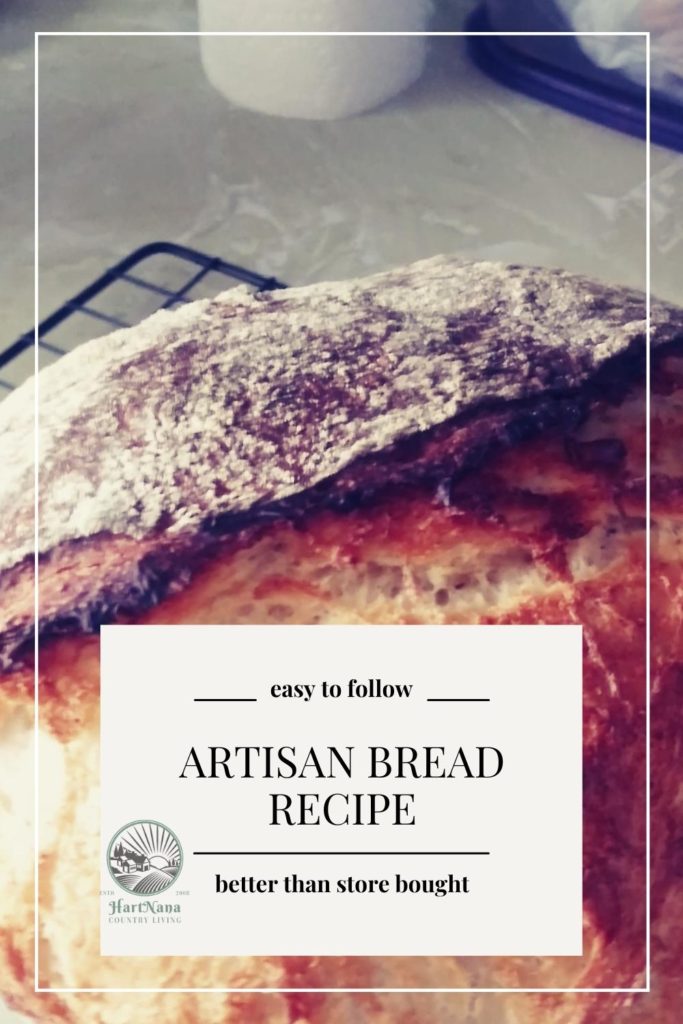As you all know by now, I love to make artisan sourdough bread at home. After years of trial and error my loaves, now, turn out consistently amazing. Yeah, I’m tooting my own horn.
Yesterday, on Facebook, a friend was struggling to make artisan sourdough bread at home. Her loaf looked pretty good in reality but would have been amazing if she did a couple little things. Used a Dutch oven, and removed the pizza stone from her oven.
The Artisan Sourdough Bread at Home Recipe
3 cups of flour – I like to use King Arthur Bread Flour
Up to 2 cups of water
1 tsp salt
1/3rd cup sourdough starter*
Add the sourdough starter to the bowl first then add flour and mix the salt into the four before mixing those into the sourdough. Then add the water. The dough should look “shaggy”. This simply means it won’t look smooth just yet. Stir in the water until all of the dough is wet but not runny. And don’t dump it all in a one time. Pour and stir until the dough pulls away from the side and the flour is incorporated. It won’t look smooth like bread dough yet. Cover it with plastic wrap and then a tea towel and leave it to rest on the counter (if it’s warmish in your house) or in the oven that has been heated up to warm but turned off and let cool down a bit. Another idea is to put it in an oven that has a pot of steaming water in it.
After an hour or so, start the folding process.
*I have a sourdough that has been growing for several years. My dad and I share it. When he comes to visit, I give him some to add to his stash, and when I visit him, he gives me some to integrate into mine. I started the sourdough starter years ago by adding flour and water together and leaving it on the counter next to my ginger bug. It’s best to do this in the spring or summer, when it’s warm.
Stretching and Pulling the Artisan Sourdough Bread
After about an hour or so, wet your hands and then start stretching the dough and folding it under. I go around the bowl twice the first time around and then once every hour or so for the next 3 or 4 hours. I usually like to let the dough sit overnight. If it’s in the winter I just leave it on the counter (it’s cold in my house at night – like 62 degrees), in the summer it goes in the fridge.
Sometimes I put it in a basket, but usually I don’t mess with baskets.
Here is a good video showing an interesting approach to making artisan sourdough bread recipe at home.
A Short Discussion about Oven Temperature
For me, in the oven I have now, I usually heat the Dutch oven to 500 degrees, then turn the oven down to 425 degrees once I’ve put the bread in. That seems to get me good oven spring and a nice ear. However, as shown in the video above, you need to do some tests to find the sweet spot for artisan sourdough bread at home for your particular oven.
The Steps
Generally, I don’t to the autolyze step when making my bread, because I let the dough sit overnight it gives it a good structure without that step. I also stretch and fold the bread early on. So, here are the steps I use.
- Pull the sourdough starter out of the fridge
- Feed the sourdough starter for a day
- Add sourdough starter to bowl (though I’m thinking I’ll use a pot this time)
- Add flour and mix the salt into the flour before mixing in the water
- Pour in the water
- Mix all of the ingredients together using your hand or this cool mixing tool (you can read about it here)
- Let this rest for an hour or so
- Fold the dough several times, pulling it up and folding it over itself from all directions
- Repeat the folding process every hour or two until you go to bed.
- Refrigerate dough (if it’s warm in your house)
- Let the dough come back to room temperature if you’ve refrigerated
- Fold dough again, using coil process
- Preheat oven with Dutch oven inside to 500 degrees
- Once oven gets up to temperature, shape dough and put on parchment paper (this is what I do to transport it to the Dutch oven)
- Turn down oven to 425
- Cook covered for 15 to 20 minutes
- Cook an additional 30 minutes or so, remove the parchment paper – watch the loaf to gauge browning.
- Remove from oven and set on rack to cool
- Resist the temptation to cut before the bread has cooled
- Enjoy the crackling noise as your yummy loaf sings to you praises for a loaf well made.
Experimenting With Various Flours
From time to time, I experiment with various types of flour. From the store brand bread flour, regular cheap all-purpose flour, King Arthur and several other non gmo brands of flour. (I know they SAY there are no gmo flours, but really, I don’t believe that). My best results for oven spring, ear and crumb come from using King Arthur bread flour, hands down. But I do know that other bread flours (as they have higher protein content) will deliver good results too. In my world view there is no such thing as bad homemade bread, only degrees of perfection.
Go forth and play with the resources you have on hand. There is nothing so satisfying as making a well-made loaf of Artisan Sourdough Bread at home.



 Find this on Amazon:
Find this on Amazon: